Market Basket: A New England Grocery Legacy
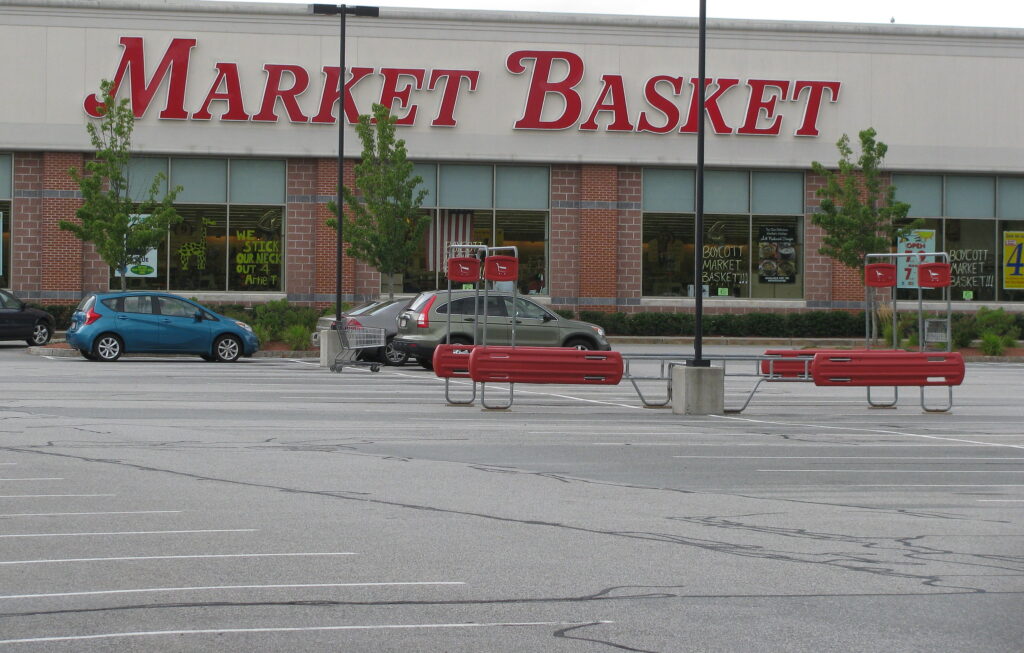
Market Basket supermarket storefront. Image source: Wikimedia Commons (CC BY-SA 4.0)
Market Basket stands as one of New England’s most beloved grocery chains, with a rich history dating back over a century. From its humble beginnings as a small family store to becoming a regional powerhouse with 90 locations across four states, Market Basket has maintained its commitment to quality, value, and exceptional customer service. Perhaps most notably, the company gained national attention in 2014 when an unprecedented employee revolt and customer boycott successfully returned beloved CEO Arthur T. Demoulas to leadership. This article explores the fascinating journey of Market Basket, its operations, culture, and what makes it a unique fixture in the New England grocery landscape.
Historical Background
From Immigrant Dream to Regional Chain
Market Basket’s story begins with Greek immigrants Athanasios and Efrosini Demoulas, who arrived in Lowell, Massachusetts from Kalambaka, Greece in 1908. Having agricultural experience from their homeland, Athanasios initially cultivated crops and tended livestock in his new country. In 1917, the couple opened a small food store in Lowell’s ethnically diverse “Acre” neighborhood, specializing in selling lamb, pork, and sausage to the local immigrant community.
Throughout the 1920s, their single “DeMoulas” store catered primarily to Greek, French, and Irish immigrant communities in downtown Lowell. When the Great Depression struck in the 1930s, the family business faced potential foreclosure. In a pivotal moment, their son Telemachus “T.A.” Demoulas left high school during his sophomore year to help save the family business.
The 1940s brought both challenges and innovation as the Demoulas family allowed customers to purchase groceries on credit—a forward-thinking approach during economically difficult times. Telemachus’s brother George joined the family business, setting the stage for significant expansion.
Expansion and Evolution
In March 1950, brothers Telemachus and George relocated the original store while remaining in Lowell’s “Acre” section, upgrading from a grocerette to a superette at 80 Dummer Street. The business took a significant leap forward in 1954 when Athanasios and Efrosine sold the business to their sons for $15,000. Under Telemachus and George’s leadership, the store expanded to a full supermarket format, and they officially coined the phrase “More For Your Dollar”—a motto that would become central to the company’s identity.
The brothers continued their expansion, opening a second DeMoulas Super Market on Bridge Street in Lowell in 1957. This larger store offered a full variety of groceries, meats, produce, and a delicatessen. By 1960, the company had introduced its first private label products, including DeMoulas brand coffee, tea, mayonnaise, and matchbooks.
A significant development came in 1963 when Telemachus established the DeMoulas Profit Sharing plan, envisioning a company where associates would directly benefit from the earnings they helped create. This innovative program remains in existence today and has been a cornerstone of the company’s employee-focused culture.
The company’s geographic footprint expanded in 1964 when they opened their sixth location and first New Hampshire store in Salem, serving customers in the Merrimack Valley and Southern New Hampshire. By 1971, they had expanded to 14 stores when tragedy struck—George Demoulas passed away while vacationing with his family in Greece.
In 1973, the company opened a new main office and distribution facility in Tewksbury, Massachusetts—a location that remains the company’s headquarters today. Another milestone came in 1975 when the company opened its 17th location and first store to carry the “Market Basket” name in Salem, New Hampshire.
Family Feud and the 2014 Revolt
The seeds of conflict were planted after George Demoulas’s death in 1971. In 1990, George’s widow and children (including his son Arthur S. Demoulas) sued Telemachus Demoulas, alleging they had been defrauded out of their shares in the company. The courts ultimately awarded George’s family approximately $206 million and 50.5% of the company.
Despite this family division, the company continued to thrive, especially after 2008 when Telemachus’s son Arthur T. Demoulas was named President and CEO. Under his leadership, sales grew from $3 billion to over $4 billion annually, and the workforce expanded from 14,000 to 25,000 employees. Arthur T. became known for his exceptional memory for employees’ names, birthdays, and milestones, often attending their weddings and funerals and checking on ill workers.
The simmering family tensions boiled over in 2013 when shareholder Rafaela Evans switched loyalties, tipping the majority vote from Arthur T. to Arthur S. The board subsequently voted to distribute $250 million to family shareholders—a move Arthur T. opposed, preferring to reinvest in the business and employees.
On June 23, 2014, the Board of Directors fired CEO Arthur T. Demoulas, triggering what would become one of the most remarkable employee actions in American business history. Six high-level executives immediately resigned in protest, and 300 employees held a rally outside the company’s Chelsea, Massachusetts flagship store.
By mid-July, the protests had grown to include 2,500-3,000 employees and customers. In an unprecedented show of loyalty, 300 warehouse workers and 68 drivers refused to make deliveries, leaving store shelves severely depleted. Customers joined the boycott, with stores losing an estimated 95% of normal business during the six-week protest.
The standoff ended on August 27, 2014, when Arthur S. Demoulas and other shareholders agreed to sell their shares to Arthur T., allowing him to regain control of the company. This extraordinary demonstration of employee and customer loyalty made national headlines and has become a case study in business schools across the country.
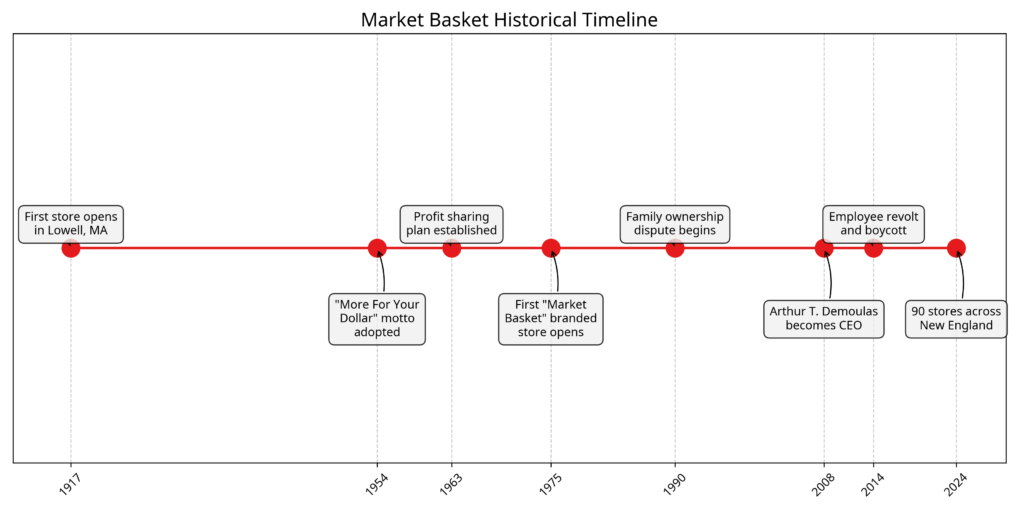
Key milestones in Market Basket’s century-long history from immigrant grocery to regional powerhouse.
Current Operations
Geographic Footprint and Store Network
Today, Market Basket operates 90 stores across New England, with 52 locations in Massachusetts, 33 in New Hampshire, and additional stores in Maine and Rhode Island. The company continues to expand, with a new location opened in Topsham, Maine in 2024 and plans for a fourth Maine store in Scarborough by 2026.
The company maintains its headquarters and distribution center in Tewksbury, Massachusetts—the same location established in 1973. This centralized distribution system allows Market Basket to efficiently supply its growing network of stores throughout the region.
Market Basket stores typically operate with consistent hours across the chain: Monday through Saturday from 7:00 am to 9:00 pm and Sundays from 7:00 am to 8:00 pm. This standardization helps maintain operational efficiency while providing customers with reliable shopping hours.
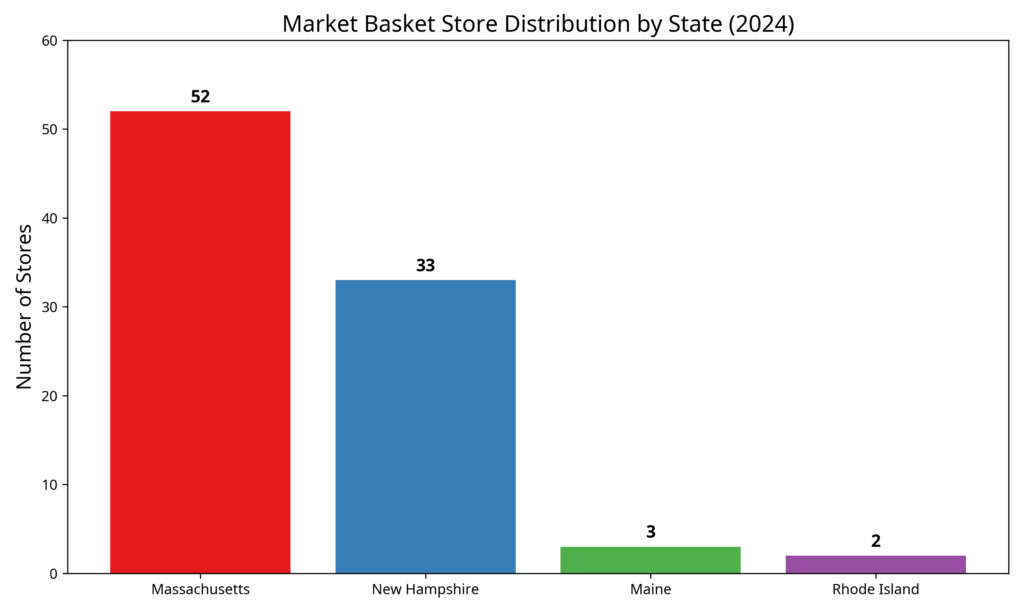
Distribution of Market Basket’s 90 stores across New England states as of 2024.
Financial Performance
While Market Basket is privately held and doesn’t disclose detailed financial information, industry analysts estimate the company’s annual revenue at approximately $4 billion. The company has maintained strong financial performance despite intense competition in the grocery sector.
Market Basket’s business model extends beyond simple profit margins. The company is known for maintaining lower prices than many competitors while still achieving profitability—a balance that has helped it weather economic downturns and competitive pressures. This approach aligns with their longstanding motto of “More For Your Dollar,” which has evolved from a marketing slogan to a core business philosophy.
The company’s financial strategy includes minimal debt, strategic reinvestment in store improvements, and careful expansion—approaches that have allowed it to maintain financial stability without sacrificing its commitment to employees and customers.
Work Environment and Culture
Employee Benefits and Practices
Market Basket’s approach to employee relations stands as one of its most distinctive features. The profit-sharing plan established by Telemachus Demoulas in 1963 continues to be a cornerstone of the company’s benefits package, allowing employees to share in the company’s success.
Beyond profit sharing, Market Basket offers healthcare benefits and paid sick leave to employees—policies that have helped foster loyalty and reduce turnover. The company is known for promoting from within, creating career paths for entry-level employees to advance to management positions.
Full-time employees typically work six days a week, reflecting the company’s traditional approach to grocery retail operations. While this schedule is more demanding than some competitors, many employees cite the company’s benefits, culture, and opportunities for advancement as compensating factors.
Leadership and Values
Arthur T. Demoulas’s leadership style has profoundly shaped Market Basket’s corporate culture. Known for remembering employees’ names, birthdays, and personal milestones, he has cultivated a family-like atmosphere that extends throughout the organization. This personal touch has earned him extraordinary loyalty, as dramatically demonstrated during the 2014 protests.
The company’s values emphasize customer service, employee satisfaction, and community involvement. Market Basket maintains a traditional approach to grocery retail, focusing on in-store experience rather than technological innovations like online ordering or delivery services. This approach has resonated with their customer base, who often cite the personal connections with employees as a reason for their loyalty.
The 2014 revolt revealed the depth of employee commitment to these values and to Arthur T.’s leadership style. Workers were willing to risk their livelihoods to preserve a corporate culture they believed in—a remarkable demonstration of how deeply the company’s values had permeated its workforce.
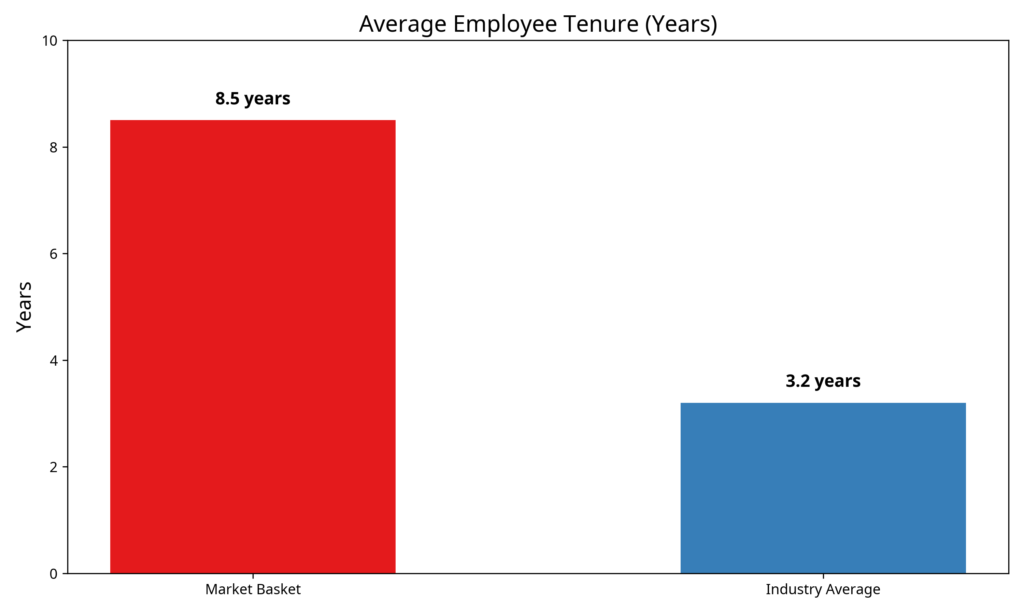
Average employee tenure at Market Basket compared to industry averages, demonstrating the company’s exceptional employee loyalty.
Merchandising Strategy
Product Selection and Pricing
Market Basket offers a wide variety of groceries, meats, produce, and delicatessen items, focusing on fresh departments and comprehensive product selection. The company maintains competitive pricing across departments, consistently positioning itself as a value leader in the markets it serves.
Since introducing private label products in 1960, Market Basket has developed a range of store brands that offer alternatives to national brands at lower price points. These private label offerings have expanded over the decades to include numerous product categories, reflecting the broader industry trend toward store brand growth.
The company balances its product mix between national brands and store brands, allowing customers to choose based on their preferences and budget constraints. This approach supports Market Basket’s overall value proposition while maintaining the product variety customers expect.
Customer Experience
Market Basket has cultivated extraordinary customer loyalty through its focus on in-store experience. The company emphasizes personal service, with well-trained employees available to assist customers throughout the store. This traditional approach to grocery retail stands in contrast to competitors who have invested heavily in technology-driven solutions like self-checkout and online ordering.
The company’s stores maintain a consistent layout and design, creating a familiar shopping environment across locations. This consistency helps customers navigate stores efficiently while reinforcing the Market Basket brand identity.
The 2014 customer boycott demonstrated the strength of Market Basket’s customer relationships. Shoppers were willing to temporarily inconvenience themselves by shopping elsewhere to support the company’s employees and culture—a remarkable testament to the connection Market Basket has built with its community.
Future Outlook
Expansion Plans
Market Basket continues to pursue measured expansion within its New England footprint. The company recently opened its 90th store in Topsham, Maine, and has announced plans for a fourth Maine location in Scarborough by 2026. This careful approach to growth allows the company to maintain its operational standards and culture while extending its reach to new communities.
The company’s expansion strategy focuses on identifying underserved markets within its existing geographic footprint rather than pushing into entirely new regions. This approach minimizes supply chain complexities while leveraging the company’s strong regional brand recognition.
Competitive Positioning
Market Basket faces significant competition in the New England grocery market from national chains like Stop & Shop and Shaw’s, as well as from high-end competitors like Wegmans. The company has maintained its competitive position through its distinctive combination of low prices, quality products, and exceptional customer service.
While many competitors have invested heavily in e-commerce capabilities and delivery services, Market Basket has maintained its focus on the traditional in-store shopping experience. This approach differentiates the company in an increasingly technology-driven market and appeals to customers who value personal interaction and the ability to select their own products.
The company’s independent, family-owned business model also distinguishes it from publicly traded competitors who face pressure from shareholders to maximize short-term profits. This independence allows Market Basket to make decisions based on long-term considerations and to maintain its distinctive approach to employee relations and customer service.
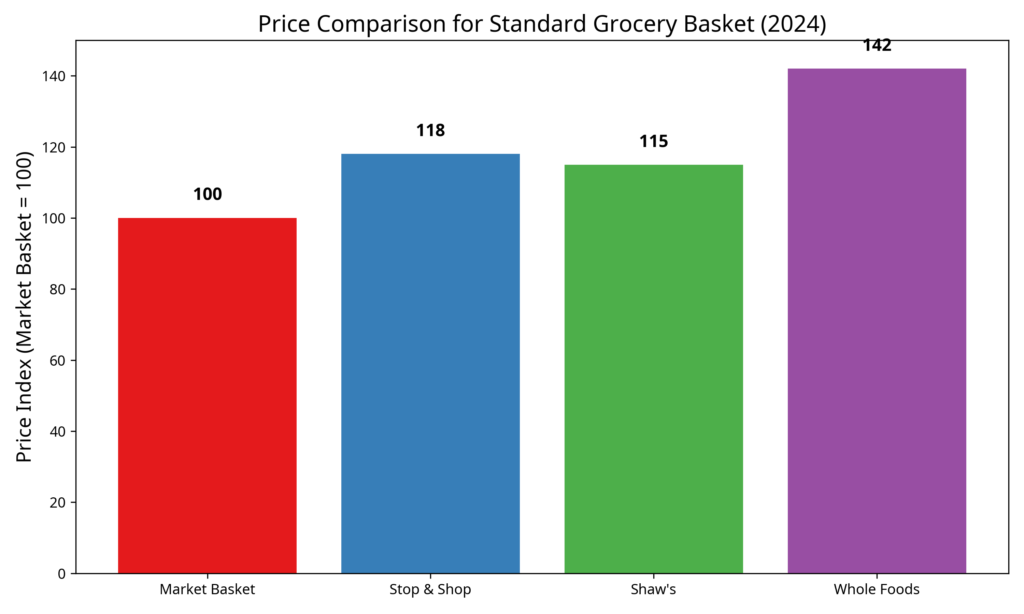
Average price comparison between Market Basket and major competitors in the New England grocery market, highlighting Market Basket’s value proposition.
Resources for Consumers and Job Seekers
For Shoppers
Market Basket offers several resources to enhance the shopping experience and help customers maximize value:
- Weekly Flyer: Available both in-store and online at shopmarketbasket.com, featuring weekly specials and promotions
- Store Locator: Find the nearest Market Basket location using the store finder tool on the company website
- Shopping List Tool: Create and manage shopping lists through the Market Basket website
- In-Store Services: Many locations offer additional services including pharmacies, floral departments, and prepared foods
- Gift Cards: Available for purchase in all stores, making them convenient gifts for friends and family
Unlike many competitors, Market Basket does not currently offer online ordering or delivery services, maintaining its focus on the in-store shopping experience.
For Job Seekers
Market Basket is known for its employee-friendly policies and opportunities for advancement. Resources for those interested in joining the company include:
- Career Portal: Job openings can be found on the “Join Our Team” section of the Market Basket website
- In-Store Applications: Paper applications are available at customer service desks in all stores
- Benefits Information: Details about the company’s profit-sharing plan, healthcare benefits, and other employee programs
- Career Paths: Information about advancement opportunities, as the company strongly emphasizes promoting from within
Market Basket’s reputation for employee loyalty and its unique corporate culture make it an attractive option for job seekers in the grocery retail industry. The company’s response to the 2014 crisis demonstrated its commitment to employees, with many workers citing job security and fair treatment as key reasons for their dedication to the company.
Final Thoughts
Market Basket’s journey from a small immigrant-owned store to a beloved regional supermarket chain illustrates the power of staying true to core values while adapting to changing market conditions. The company’s commitment to its “More For Your Dollar” philosophy has created a distinctive position in the competitive grocery landscape, while its employee-focused culture has fostered extraordinary loyalty.
The 2014 revolt stands as a watershed moment in the company’s history—a dramatic demonstration of how deeply Market Basket’s values had resonated with both employees and customers. This unprecedented event not only secured Arthur T. Demoulas’s return to leadership but also reinforced the company’s unique identity in the marketplace.
As Market Basket continues to expand its footprint across New England, it faces the challenge of maintaining its distinctive culture and operational approach while adapting to evolving consumer preferences and technological innovations. The company’s history suggests it will navigate these challenges by staying true to the principles that have guided it for over a century: quality products, fair prices, and treating employees and customers like family.
For New England shoppers seeking value without sacrificing quality or service, Market Basket remains a compelling option—a grocery chain where the motto “More For Your Dollar” represents not just a pricing strategy but a comprehensive approach to doing business.
References (click to expand)
- Market Basket Company Timeline – https://www.shopmarketbasket.com/timeline/
- Wikipedia: Market Basket protests – https://en.wikipedia.org/wiki/Market_Basket_protests
- Market Basket Revenue Information – https://www.zippia.com/market-basket-careers-30380/revenue/
- Market Basket Store Locations – https://www.shopmarketbasket.com/store-locations
- “Market Basket: Workers risk it all for their boss” – BBC News, August 1, 2014
- “Market Basket marks 10 years since unprecedented summer of protests” – CBS Boston, August 27, 2024
- “Market Basket to open fourth Maine location” – News Center Maine, November 20, 2024
- “Market Basket opens much anticipated store in Topsham” – Central Maine, June 14, 2024
- Employee reviews from Indeed.com and Glassdoor.com
- “The rise of private labels: A global perspective on growth and consumer trends” – NIQ, November 19, 2024







Leave A Comment